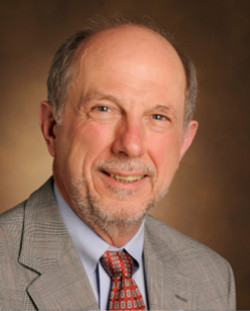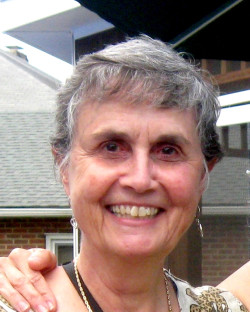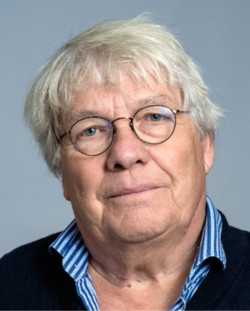Plenary Speakers

F. Peter Guengerich, Ph.D.
Mechanisms of Complex Cytochrome P450 Reactions–New Insights
Dr. F. Peter Guengerich is the Tadashi Inagami Professor of Biochemistry at Vanderbilt University School of Medicine, where he also served as Director of the Center in Molecular Toxicology for 31 years.
Prof. Guengerich will discuss updates and new insights into several P450 reactions that involve multiple steps and C–C bond cleavage reactions, including some with model substrates, steroids, and natural products. Issues include the processivity of multi-step reactions and their sensitivity to inhibition. Another topic of interest is the use of isotopic labeling to define details of P450 intermediates involved in catalytic steps.
Prof. Guengerich has been a tenure-track faculty member at Vanderbilt University for 49 years and made a number of important contributions to P450 research, as well as with other enzymes involved in the metabolism of drugs and carcinogens. He has also served as a teacher, mentor, and editor during this time and continues in these roles.

Bettie Sue Masters, PhD, DSc, MD
A Sojourn Down MDO Memory Lane
Bettie Sue Siler Masters, Ph.D., D.Sc., M.D. (Hon.) is currently Adjunct Professor of Biochemistry at Duke University Medical Center in Durham, North Carolina, USA. She is Professor Emeritus of the University of Texas Health Science Center at San Antonio, Texas, after 26 years as the Robert A. Welch Distinguished Professor in Chemistry there.
Her life’s work has been the structure, function and mechanisms of two important mammalian flavoproteins, NADPH-cytochrome P450 reductase and the three isoforms of nitric oxide synthase, both of which uniquely contain FAD and FMN.
Her work with the reductase began when its physiological function was unknown and, as its role as the primary cytochrome P450 reductase was elucidated, the separate role of a heme protein in its function led her laboratory to the discovery of heme within the protein structures of the nitric oxide synthases reported in 1992.
During her career, Dr. Masters was recognized by the Excellence in Science Award by the Federation of American Societies for Experimental Biology and the Bernard B. Brodie Award by the American Society for Pharmacology and Experimental Therapeutics.
She has received the honorary degrees of Doctor of Science from Roanoke College and the Medical College of Wisconsin and was awarded the Doctorem Medicinae Honoris Causae from Charles University in Prague in 2005. She was elected to the U.S. National Academy of Medicine and as a Fellow of the American Association for the Advancement of Science in 2001 and the American Society for Biochemistry and Molecular Biology in 2024.

Emily E. Scott, Ph.D.
Structural Biology of P450 Enzymes from LM2 to CYP2J2
Dr. Emily E. Scott is the F. F. Blicke Collegiate Professor of Pharmacy at the University of Michigan, with additional appointments in Biophysics, Biological Chemistry, and Pharmacology.
Prof. Scott will discuss new insights into the structural dynamics of several human cytochrome P450 enzymes, particularly in response to interactions with their redox partner proteins including cytochrome b5 and the FMN-containing domain of NADPH-cytochrome P450 reductase. A number of distinct methods support conformational selection upon P450 protein/protein interactions.
Prof. Scott has studied almost half of the human cytochrome P450 enzymes and made critical contributions to our understanding of their structure and function. Her structures to date have focused on those involved in xenobiotic/drug metabolism (CYP1A1, CYP2A6, CYP2A13, CYP2E1, CYP3A4) and steroidogenesis (CYP17A1, CYP11B1, CYP11B2, CYP8B1, CYP3A7). Recent emphasis has expanded to include structural and functional impacts of interactions with redox partners. Currently an AAAS and ASPET Fellow, she has been awarded a MERIT Award from NIH and
new investigator awards from ISSX and the Drug Metabolism and Disposition Division of ASPET.

Magnus Ingelman-Sundberg, Ph.D.
Enhancing Drug Development Through Innovative 3D Liver Models
Magnus Ingelman-Sundberg will discuss the application of novel 3D spheroid systems that effectively preserve patient-specific phenotypes and functions for prolonged periods in culture. These models serve as powerful tools for predictive and mechanistic analyses of drug-induced hepatotoxicity, as well as for evaluating hepatic disposition and metabolite formation in low clearance drugs. Additionally, they play a crucial role in mechanistic analyses and drug development for various pathological conditions, including fibrosis, viral hepatitis, and NASH.
Magnus Ingelman-Sundberg is Professor of Molecular Toxicology at the Department of Physiology and Pharmacology, Karolinska Institutet. He received the 2022 R.T. Williams Distinguished Scientific Achievement Award in 2022, is a former member of the Nobel Assembly and has repeatedly been assigned “Highly Cited Researcher” by Clarivate.



